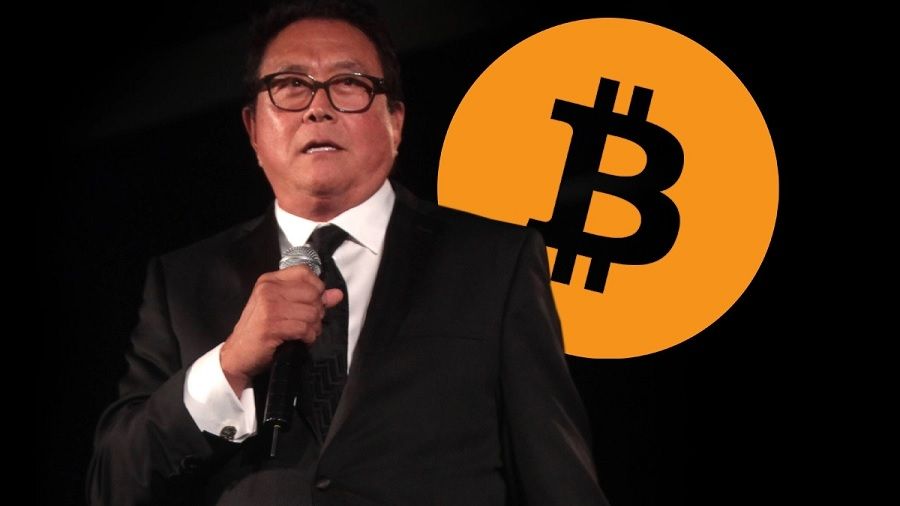Robert Kiyosaki Aims for 100 Bitcoin by 2025, Stresses Consistent Investment
10.11.2024 14:00 2 min. read Kosta Gushterov
Robert Kiyosaki, the author of Rich Dad Poor Dad, is determined to acquire 100 Bitcoin by 2025.
Already holding 73, he continues to buy more, rejecting the mindset of waiting for prices to fall. In a recent tweet, he explained that unlike those who wait for discounts like “poor people,” his approach to building wealth involves consistent, long-term investment.
Kiyosaki’s investment journey began with silver when it was priced at just $1 per ounce. As silver’s value soared to $32 per ounce, he kept purchasing more instead of waiting for a dip, a lesson he applies to all his investments. He believes that building wealth comes from regular accumulation, not waiting for lower prices.
He first bought Bitcoin when it was priced around $6,000 per coin, and despite its rise to approximately $76,000, Kiyosaki is committed to adding to his Bitcoin holdings. His goal of owning 100 BTC by 2025 is driven not by trying to buy at the lowest price, but by the quantity of Bitcoin he can accumulate over time.
In addition to cryptocurrency, Kiyosaki also invests in gold, silver, income-producing real estate, and gold mines. By diversifying his investments, he spreads risk and increases his chances of wealth growth. Reflecting on his journey, Kiyosaki admits he wishes he had bought Bitcoin at $10 per coin, but he emphasizes that waiting for lower prices only hinders financial growth. For him, the key to wealth is steady, long-term investment in valuable assets.
-
1
BlackRock’s Bitcoin ETF Now Out-Earning Its $624B S&P 500 Fund
03.07.2025 10:00 1 min. read -
2
Market Turmoil, War Fears, and a $70 Million Bet Against Bitcoin: James Wynn’s Stark Warning
21.06.2025 16:00 2 min. read -
3
Strategy’ Michael Saylor Drops Another Cryptic Bitcoin Message
24.06.2025 21:00 1 min. read -
4
‘Nobody Saw This Coming’: Saylor Points to Political Winds Fueling Bitcoin Boom
22.06.2025 10:00 2 min. read -
5
Strategy Adds to Its Bitcoin Pile Again, Shrugging Off Market Slump
23.06.2025 17:00 1 min. read
Bitcoin: Is the Cycle Top In and How to Spot It?
Bitcoin may not have reached its peak in the current market cycle, according to a recent analysis by crypto analytics firm Alphractal.
BlackRock’s IBIT Bitcoin ETF Surpasses 700,000 BTC in Record Time
BlackRock’s iShares Bitcoin Trust (IBIT) has officially crossed the 700,000 BTC mark, reinforcing its position as one of the fastest-growing exchange-traded funds in financial history.
Bitcoin: Historical Trends Point to Likely Upside Movement
Bitcoin may be gearing up for a significant move as its volatility continues to tighten, according to on-chain insights from crypto analyst Axel Adler.
Trump’s Two big Bitcoin Moves: Key Catalysts or Just Noise for BTC Price?
Two major developments are converging in July that could shape the future of Bitcoin in the United States—both tied to President Trump’s administration and its expanding crypto agenda.
-
1
BlackRock’s Bitcoin ETF Now Out-Earning Its $624B S&P 500 Fund
03.07.2025 10:00 1 min. read -
2
Market Turmoil, War Fears, and a $70 Million Bet Against Bitcoin: James Wynn’s Stark Warning
21.06.2025 16:00 2 min. read -
3
Strategy’ Michael Saylor Drops Another Cryptic Bitcoin Message
24.06.2025 21:00 1 min. read -
4
‘Nobody Saw This Coming’: Saylor Points to Political Winds Fueling Bitcoin Boom
22.06.2025 10:00 2 min. read -
5
Strategy Adds to Its Bitcoin Pile Again, Shrugging Off Market Slump
23.06.2025 17:00 1 min. read


